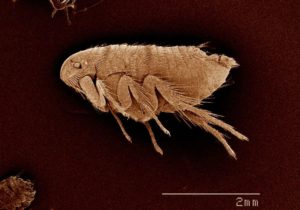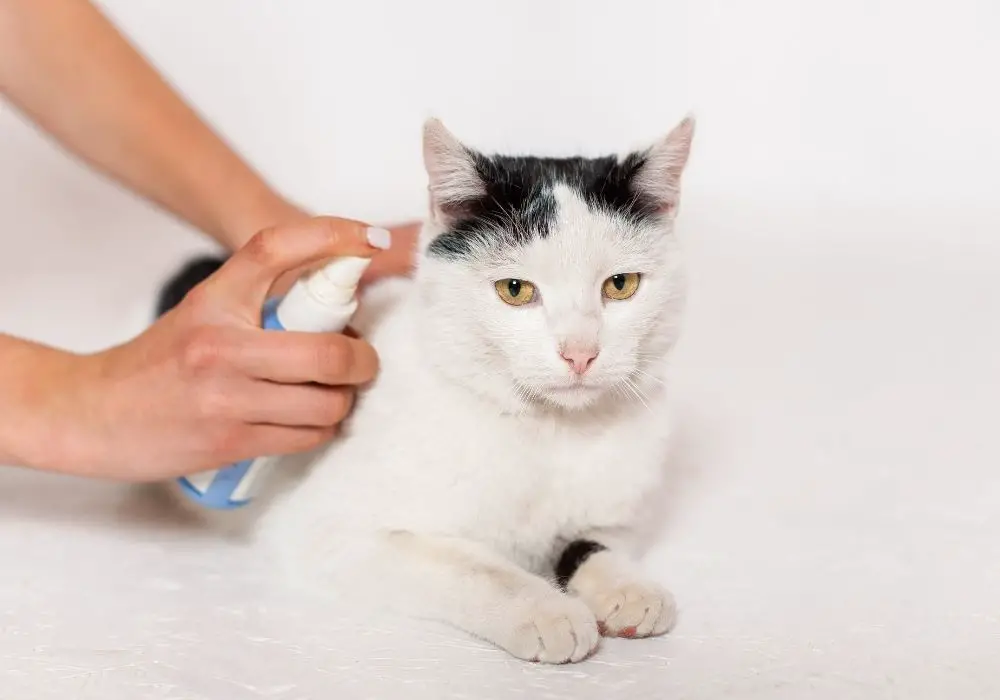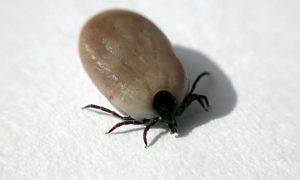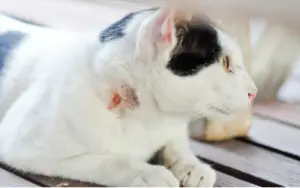When a cat keeps scratching its neck, 9 times out of 10 there is an underlying issue that needs to be addressed. In this article, we will examine some of the most common causes of itchiness in the neck. We’ll also provide your cat with some much-needed relief by detailing how to fix these common issues. First, let’s take a look at possible answers to this question:
Cats that won’t stop scratching their neck usually have parasites like fleas or ticks that need to be dealt with. A healing wound can also cause itchiness, and finally, it could be an allergic response to things like house mites or something in your cat’s diet.
Now that you know the most common causes for neck scratching, let’s go into more detail;
Fleas

Fleas are one of the most common causes of compulsive scratching and licking. These pesky parasites hide in an unsuspecting cat’s coat, potentially avoiding detection for months – or until an observant owner discovers an odd bump. By then, the itchiness has likely become a serious source of grief for your poor kitty.
Fleas are sneaky bastards; they only spend a small part of their lifecycle on your cat. The remainder is spent in the household: on your curtains, in the bed, or on a living room rug.
There are effective treatments for fleas available, but the buggers can come back as soon as treatment has ended. That’s why it’s important to be very thorough and treat all of your pets and furniture at the same time.

How to check for fleas:
You can check for the presence of fleas by gently pulling back plucks of hair and carefully examining the skin of your cat. Be on the lookout for small black dots.
Going through the coat with a good flea comb may also prove useful in determining whether your cat needs a flea treatment.
The solution to fleas:
If you weren’t able to prevent fleas, you’ll have to buy a treatment in the form of tablets or topical products. Catpointers recommends picking up an anti-flea product that is vouched for by veterinarians, as those products always contain enough active ingredients to be effective.
To get the most out of flea treatment products, you’ll have to follow the instruction on the packaging carefully. Our own Hannah wrote an article which explores the various reasons why flea treatments can fail.
Ticks

These creepy bloodsuckers are very common throughout the world and are most active during spring and autumn. Ticks look like tiny eight-legged spiders that vary in size from 1 mm to 10 mm (or half an inch), making them big enough to spot with the naked eye. Ticks can cause a lot of itchiness, and they have to be removed as soon as possible because they carry all kinds of dangerous diseases, the most obvious one being Lime disease.
How to check for ticks:
You can check your cat for ticks by running your hands over their body and feeling for bumps. A tick sucks blood and swells larger, which makes them easier to detect the longer they’ve been attached to the skin. Important areas to look for ticks are your cat’s neck, head, and paws.
The solution to ticks:
If you find a tick, do not attempt to remove it with your bare hands or with tweezers. Doing so makes it more likely that you’ll push the tick further inside the skin, increasing the chance of infection. The best way to remove ticks is with a special tick remover. BlueCross has a great instructional video on how to use this tool to remove ticks from a cat.
Neck wounds

If you’ve ever had a big wound, you may have caught yourself scratching it back open. This is because healing wounds have a tendency to become extremely itchy at times.
Cats that keep scratching their necks in the same spot should therefore not only be checked for parasites like ticks and fleas, but also for scabs and wounds on the skin.
The healing of a wound can easily be disrupted by sharp claws. So if your cat is constantly reopening the wound, you will have to take action because the wound will never get a chance to fully heal.
How to check for itchy wounds:
Carefully pull back plucks of hair and examine the skin for wounds or scabs. Be sure to check the whole area surrounding the spot where your cat keeps scratching.
Possible solutions to itchy wounds:
- If you do find a wound, it’s important that you keep it clean and dry to promote healing and prevent bacterial infections. Gently bathe the wound with boiled cooled water, and then dab on some leucillin antiseptic.
- You can prevent your cat from scratching wounds back open by applying a set of soft nail caps on the paws to prevent further scratching. You can take these off again once the wound has fully healed.
- If the wound has already started to infect, you’ll have to call the vet immediately. Your cat will likely need a round of antibiotics.

Allergies / Food intolerance
Skin problems, food allergies and allergies to house mites (Atopy) can cause a lot of itchiness in the neck, ears, and head. These are harder to pinpoint at home, which is why it’s worth getting your cat checked up by a vet if you suspect one of these to be the culprit.
How to check:
Take your cat to a veterinarian. Unless you can spot a rash, it’s very difficult if not impossible to make an accurate diagnosis on these without the help of a qualified professional.
Possible solutions:
Elimination diets can prove useful to verify whether something in your cat’s diet is setting off the immune system. If you see a rash or red skin, you’ll want to bring your kitty to a vet to see what’s causing these skin problems. They may be able to diagnose it right there and then, or decide to scrape some skin samples for further examination.
Final words
So, if you’re wondering why your cat keeps scratching its neck, now you know what to look for and how to solve the problem. Remember; if you still don’t know what to do, it’s okay to call the vet and have them take a look. Itchiness is no fun, and your kitty will very much appreciate your help!





